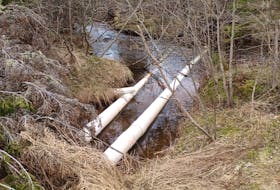ARGYLE SHORE, P.E.I. - A necropsy will be performed next week on a leatherback sea turtle that was discovered dead Friday on a beach in Argyle Shore.
Megan Jones, regional director of the Canadian Wildlife Health Co-operative with the Atlantic Canada region at the Atlantic Veterinary College (AVC) in Charlottetown, says the necropsy will be done to try to determine the cause of death and to collect data on the animal.
Jones says the turtle, which weighs about 450 kilograms and is roughly two metres in length, was likely dead for at least a few days.
The turtle was frozen when it was found dead along the beach in Argyle Shore Friday morning.
Ken Mayhew, a spokesman with the province’s Forests, Fish and Wildlife division, says getting the turtle to the AVC was a long, slow process.
The large animal was floated along the beach to an area where a crane was able to haul it up an embankment and place it on a trailer. The process took two to three hours.
“You never know what you are going to find floating around here,’’ says Mayhew.
“It is not unusual to get these calls from the public.’’
A postmortem was done on P.E.I. in February for an endangered leatherback turtle found washed up in Cape Breton.
The turtle was discovered in Bras d'Or Lake, far from the usual southern winter sites for the leatherback turtles.
Turtle tidbits
Here are some facts on the leatherback sea turtle:
- One of seven species of marine turtles in the world
- Evolved around 100 million years ago and co-existed with the dinosaurs
- The shell is shaped like a teardrop with seven distinct dorsal ridges tapering at the tail
- The adults that frequent Atlantic Canadian waters have an average curved carapace (shell) length of approximately 1.5 metres and an average weight of approximately 400 kilograms
- The throat and esophagus are covered with spines, which are believed to be an adaptation to assist in swallowing slippery jellyfish prey
Source: Fisheries and Oceans Canada








